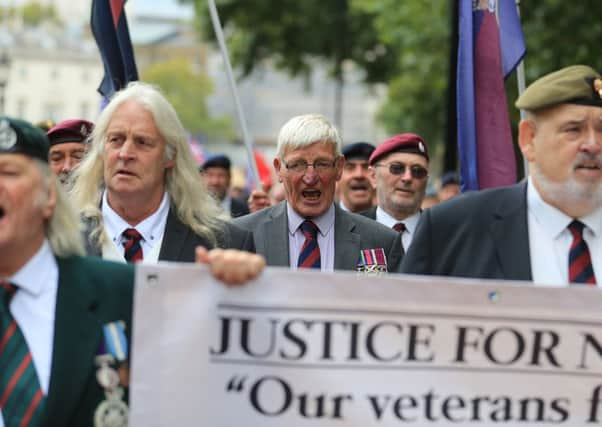Veterans right to protest over '˜incredible imbalance'


The Ulster Unionist Party’s Doug Beattie said there was “incredible imbalance” in the justice system which has led the group Justice For Northern Ireland Veterans to demonstrate publicly.
Hundreds of army veterans marched in Westminster on Saturday alongside a former soldier who is facing prosecution in connection with the death of a man during the Troubles.
Advertisement
Hide AdAdvertisement
Hide AdDennis Hutchings, 76, is due to stand trial on charges linked to the shooting of John Pat Cunningham, a 27-year-old with learning difficulties who was killed in disputed circumstances in Co Armagh in 1974.
Hutchings is accused of the attempted murder of unarmed Mr Cunningham. A court has heard that when the victim was shot he was running away from an army patrol because he had a fear of men in uniform.
Hutchings, of Cawsand, Cornwall, is also facing a charge of attempting to cause grievous bodily harm to Mr Cunningham.
Campaign group Justice For Northern Ireland Veterans organised the solidarity march to protest at a number of recent investigations into the conduct of soldiers stationed in Northern Ireland during the Troubles, which they say has been an “unfair witch-hunt”.
Advertisement
Hide AdAdvertisement
Hide AdThe march was met with a counter demonstration by campaigners holding a silent vigil and carrying placards which read ‘I am John Pat Cunningham’.
At points, there were verbal clashes.
As the group of ex-soldiers marched past parliament, Mr Hutchings threw his military medals at the building.
Mr Beattie commented: “It’s a symptom of how those who served in Northern Ireland feel that the system is unjustly balanced against them.
“It’s fair and right that they have the opportunity to express that using the case of Mr Hutchings as a conduit for that.”
Advertisement
Hide AdAdvertisement
Hide AdMr Beattie added: “In the same case, I’ve got to say that the people who protested for John Pat Cunningham have the right to do the same.
“I can’t sit here and say to one group who is demonstrating that they’re right or they’re wrong, and the same to the other.”
He continued: “This is more to me a symptom of how veterans feel.
“People will disagree with me, but many veterans feel that the system is unbalanced against them.
Advertisement
Hide AdAdvertisement
Hide Ad“When you look at what is proposed in the HIU (Historical Investigations Unit) – and I’m not talking about what we see today with the legacy investigations branch – but when you look at what is proposed in the HIU it is incredibly unbalanced against those people who served in the Province.
“I also think there’s a severe lack of understanding both at the Westminister government and the people in the United Kingdom about what the real issues are. This is something that needs to be addressed.”
Discussing reports of minor disturbances as the protest clashed in London on Saturday, Mr Beattie commented: “I’ve read that there was exchanges and heard about altercations but I’ve seen no evidence.
“If it was the case that soldiers were jeering at victims’ families or vice versa I would condemn it.”
Advertisement
Hide AdAdvertisement
Hide AdFollowing the march, Mr Hutchings said: “I hope (the march) shows the government they have to do something about this absolute travesty of justice.”
One of the march organisers Alan Barry stated: “If you let terrorists go free from jail, you cannot then go and prosecute the very people who were sent in to fight that dirty war in the first place, and that was us.”
Many of the veterans wore their former military uniforms, decorated with medals they were awarded for their time in Northern Ireland and also carried Union and Northern Ireland flags.
After congregating in Horse Guards Parade, they marched to parliament via Buckingham Palace and Trafalgar Square.
Advertisement
Hide AdAdvertisement
Hide AdPaul O’Connor, from the Pat Finucane Centre which works with the Cunningham family, was among those counter-protesting.
He said: “I know that the British Army has had a culture of impunity over the years and they believe that they are not subject to the rule of law like anyone else, but they are - or they should be.”
Mr O’Connor claimed some of those involved in the rally were abusive toward the counter-protesters.
Other counter-protests took place at locations in Northern Ireland including Belfast, Londonderry, Strabane and County Armagh.
Advertisement
Hide AdAdvertisement
Hide AdThe director of public prosecutions Barra McGrory has strongly denied any bias against soldiers in decisions on whether to prosecute over historical deaths.
In January, he said: “The simple and clear reality is that we deal with cases as they are referred to us, in accordance with the Code for Prosecutors. There is no imbalance of approach within the PPS (Public Prosecution Service).”